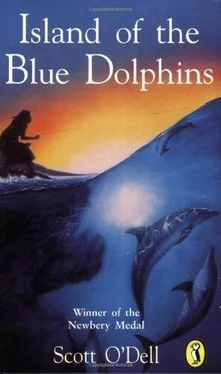I jumped to my feet. ‘Tutok,’ I cried, running down the ravine. ‘Tutok.’
She came out of the brush so quickly that she must have been waiting near by to see if I would return.
I ran to the rock and put on the necklace and turned around for her to admire it. The beads made not two loops but three. They were long and oval instead of round, which is a very hard shape to make and takes much skill.
‘ Wintscha ,’ she said.
‘ Wintscha, ’ I said, after her, the word strange on my tongue. Then I said the word that meant pretty in our language.
‘ Win-tai,’ she said and laughed, because this was strange to her.
She touched the necklace, giving the word for it, and I gave mine. We pointed out other things — the spring, the cave, a gull flying, the sun and the sky, Rontu asleep — trading the names for them and laughing because they were so different. We sat there on the rock until the sun was in the west and played this game. Then Tutok rose and made a gesture of farewell.
‘Mah-nay,’ she said and waited to hear my name.
‘Won-a-pa-lei,’ I answered, which as I have said, means The Girl with the Long Black Hair. I did not tell her my secret name.
‘ Mah-nay, Won-a-pa-lei,’ she said.
‘ Pah-say-no , Tutok,’ I replied.
I watched her go through the brush. I stood for a long time listening to her footsteps, until I could hear them no more, and then I went to the headland and brought the baskets back to the cave.
Tutok came again the next day. We sat on the rock in the bright sun, trading words and laughing. The sun went fast in the sky. The time came soon when she had to leave, but she returned on the day that followed. It was on this day, when she was leaving, that I told her my secret name.
‘Karana,’ I said, pointing to myself.
She repeated the word, but she did not understand what it meant.
‘Won-a-pa-lei,’ she said, frowning.
I shook my head. Pointing again to myself, I said, ‘Karana.’
Her black eyes opened wide. Slowly she began to smile.
‘Pah-say-no, Karana,’ she said.
That night I began to make a gift for her, in return for the necklace she had given me. At first I thought I would give her a pair of my bone ear-rings, but remembering that her ears were not pierced and that I had a basket of abalone shells already flaked into thin disks, I set about making a circlet for her hair. I bored two holes in each of the disks, using thorns and fine sand. Between them I put ten olivella shells, which were no larger than the tip of my little finger, and threaded them all together with sinew.
I worked five nights on the circlet and on the fifth day when she came I gave it to her, putting it around her head and tying it in the back.
‘ Wintscha, ’ she said and hugged me. She was so pleased that I forgot how sore my fingers were from boring the holes in the hard shells.
Many times she came to the cave, and then one morning she did not come. I waited for her all that day and at dusk I left the cave and went to the ledge where I could watch the ravine, fearing that the men had learned that I lived here and would find me. That night I slept on the ledge. The night was cold with the first wind of winter.
Tutok did not return the next day and I remembered that it was near the time when the Aleut hunters would leave. Perhaps they had already gone. That afternoon I went to the headland. I climbed the rock and crawled across it until I could look over the rim. My heart beat loud.
The Aleut ship was still there, but men were working on the deck and canoes were going back and forth. The wind blew hard and few bales of otter skins lay on the shore so probably the ship would leave at dawn.
It was dark when I got back to the ravine. Since the wind was very cold and I was no longer afraid that the Aleuts would find me, I made a fire in the cave and cooked a supper of shellfish and roots. I cooked enough for Rontu and me and for Tutok. I knew Tutok would not come, yet I put her food beside the fire and waited.
Once Rontu barked and I thought I heard the sound of footsteps and went to the opening and listened. I waited a long while and did not eat. Clouds moved from the north, covering the cold sky. The wind grew louder and made wild noises in the ravine. At last I closed the mouth of the cave with stones.
At dawn I went to the headland. The wind had died. Fog lay over the sea, washing against the island in grey waves. I waited a long time for a glimpse of Coral Cove, but finally the sun burned away the fog. The little harbour was deserted. The Aleut ship with its red-beaked prow and red sails had gone.
At first, knowing that I could now leave the cave and move back into my house on the headland, I was happy. But as I stood there on the high rock looking down at the deserted harbour and the empty sea, I began to think of Tutok. I thought of all the times we had sat in the sun together. I could hear her voice and see her black eyes squinting closed when she laughed.
Below me, Rontu was running along the cliff, barking at the screaming gulls. Pelicans were chattering as they fished the blue water. Far off I could hear the bellow of a sea elephant. But suddenly, as I thought of Tutok, the island seemed very quiet.
The hunters left many wounded otter behind them. Some floated in and died on the shore and others I killed with my spear since they were suffering and could not live. But I found a young otter that was not badly hurt.
It lay in a bed of bull kelp and I would have paddled by if Rontu had not barked. A strand of kelp was wound around its body and I thought it was sleeping, for often before they go to sleep they anchor themselves in this way to keep from drifting off. Then I saw there was a deep gash across its back.
The otter did not try to swim away as I drew near and reached over the side of the canoe. They have large eyes, especially when they are young, but this one's were so large from fear and pain that I could see my reflection in them. I cut the kelp that held it and took it to a tide pool behind the reef, which was sheltered from the waves.
The day was calm after the storm and I caught two fish along the reef. I was careful to keep them alive, because otter will not eat anything that is dead, and left them in the pool. This was early in the morning.
That afternoon I went back to the pool. The fish had disappeared and the young otter was asleep, floating on its back. I did not try to treat its wound with herbs because salt water heals and the herbs would have washed off anyway.
I brought two fish every day and left them in the pool. The otter would not eat while I was watching. Then I brought four fish and these also disappeared and finally six, which seemed to be the right number. I brought them whether the day was calm or stormy.
The otter grew and its wound began to heal, but still it stayed in the pool, and now when I came it would be waiting for me and would take the fish from my hand. The pool was not big and it could easily have got out and away into the sea, yet it stayed there and slept or waited for me to come with food.
The young otter now was the length of my arm and very glossy. It had a long nose that came to a point and many whiskers on each side and the largest eyes I have ever seen. They would watch me all the time I was at the pool, following me whatever I did, and when I said something, they would move around in a very funny way. In a way, too, that made pain come to my throat because they were gay and sad also.
For a long time I called it Otter as I had called Rontu, Dog. Then I decided to give the otter a name. The name was Mon-a-nee, which means Little Boy with Large Eyes.
Читать дальше











